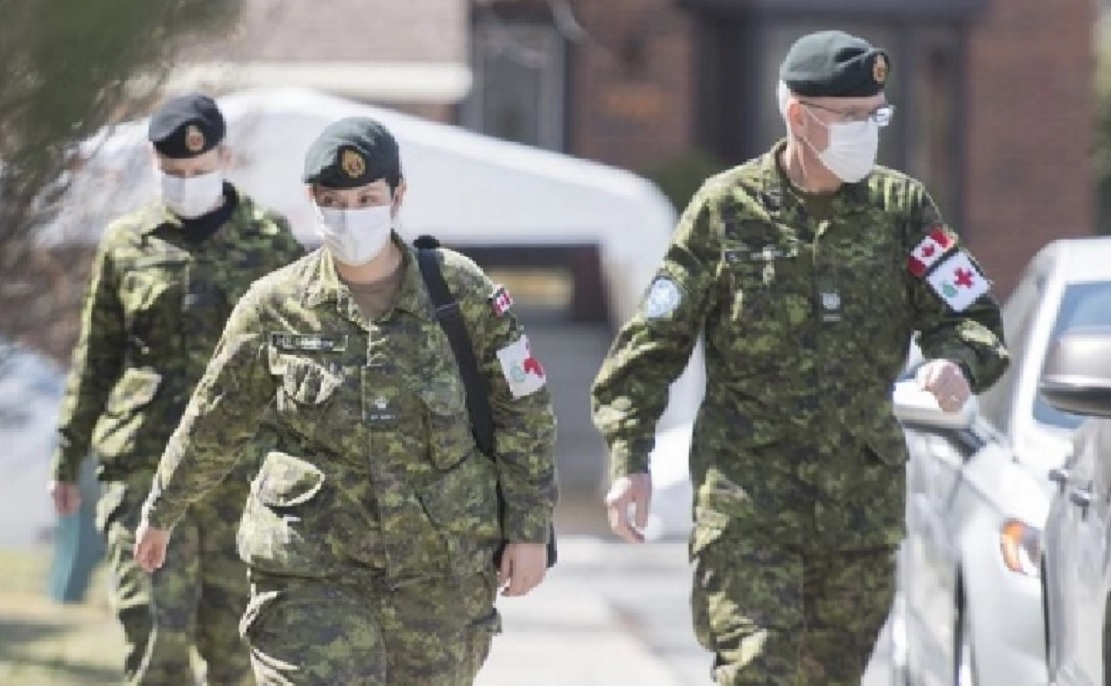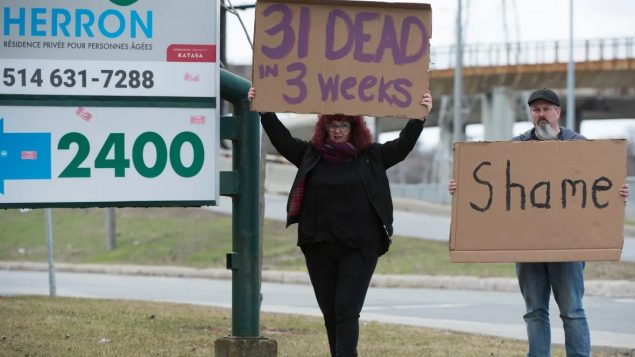As of Monday there have been over 1,600 coronavirus-related deaths across the country with well over 800 in Quebec the highest rate in the country. A majority, 60 per cent, of the deaths have occurred in the province’s retirement residences and long-term care nursing facilities known as CHLSD’s (Centre d’hébergement de soin de longue durée).
Now members of the Canadian military medical staff have been sent in to help out.
Many of the staff at the province’s CHLSD’s had earlier reported working without protective equipment against the virus. Many then stayed away from their jobs fearing for their own health, or had to go into isolation having reported symptoms or testing positive. This left many of the facilities woefully understaffed with conditions inside deteriorating.
In addition to elderly residents dying, at least one CHLSD orderly is reported to have died from the infection.

Three members of the Canadian forces wearing large medical service insignia on their shoulders, arrive at the Residence Yvon-Brunet seniors home in Montreal to assess needs and how the military can help, Other personnel have been sent to several other hard hit seniors residences to assess needs there as well. (Graham Hughes- Canadian Press)
As the death toll of elderly mounted and word got out about conditions, the province stepped in to take over in some cases, but also put out a call for retired doctors and nurses to help out in understaffed locations. Last week, Quebec Premier Francois Legault also requested additional help from Ottawa to send in medical teams from the military.
That help arrived on Friday and Saturday in the form of some 125 nursing officers, medical technicians and support personnel.
- RCI: Apr 13/20: Seniors residences under investigation in Quebec
- RCI: Apr 16/20: Quebec requests military to fight COVID-19 in nursing homes
They will assess needs regarding further help so additional resources can be deployed quickly as needed and where needed.
They are concentrating for the moment on five long-term care centres which have been the most affected by deaths and infections. Team members have been consulting over the weekend with the residence’s managers to coordinate how to proceed.
Lt.-Cmdr. Heather Galbraith, a physician in the Royal Canadian Navy, was quoted by the CBC saying, Canadian Forces medical staff are well versed in providing health care, adding, “I will say they’re not used to working in a long-term care facility, per se. However, they are very, very clinically minded”. In preparation, some members of the CF team are currently undergoing geriatric care training at a military facility in Quebec.
A Canadian Forces press release on Saturday said, “For the moment, five long-term care centres in the Greater Montreal area are at the heart of the reconnaissance efforts and the needs analysis will be performed in liaison with the civilian teams on site. Once the actual roles and tasks are clarified, the deployed intervention teams will be composed of one nurse and 12 technicians from the 4 Health Services Group (4 H Svcs Gp), each supported by support staff. The tasks performed by military personnel will vary according to the needs identified by our civilian partners. Among other things, the military will support the civilian health professionals already in place by augmenting the strength of each location”..
.A review of the the provinces 41 CHLSD’ long term care facilities has been ordered along with a coroner’s investigation into at least one of them.
additional information-sources
- CBC: Apr 18/20 COVID-19 Quebec-Armed Forces members arrive to help in long-term care homes
- Montreal Gazette: Apr 19/20: COVID-19: Canada sends army to Quebec care homes
- Canadian Press (via CTV) Apr 19/20: COVID-19 continues to ravage Quebec seniors homes
- Canadian Press (via PostMedia) C.Reynolds: Apr 18/20: Grim numbers emerge at Montreal nursing home as military prepares to step in







For reasons beyond our control, and for an undetermined period of time, our comment section is now closed. However, our social networks remain open to your contributions.